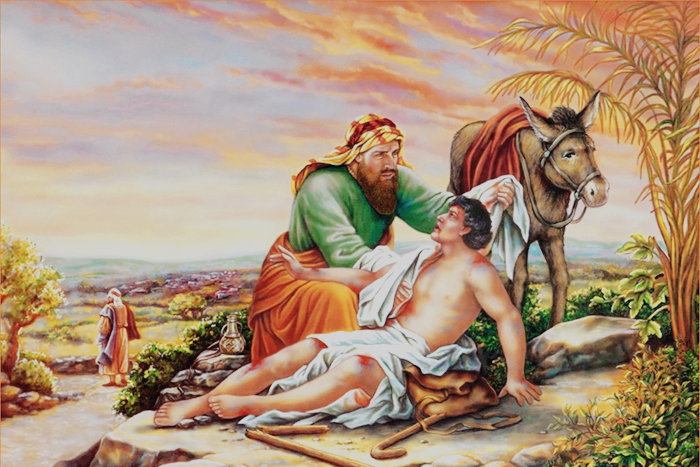
(Job; James 5:11; Ezekiel 14:14-20)
Tell me, brother, what you are able to endure,
And how much of a man you are, I will tell you.
Job the righteous rich man and all-glorious
By Satan on a dunghill was thrown,
And with pus and sores covered,
To dogs and to men, a horrifying sight!
Whatever he had in a day perished
Except faith and except patience.
But with the weapons of faith and patience,
Job, the horrible Satan overcame.
The uneven struggle God looked upon:
To the righteous one, victory He imparted.
With victory, all other riches,
And the envious devil shamed.
This is the way in which Job is described, in the Prologue of Ohrid, by St. Nikolai Velimirovic, of blessed memory not only in his homeland of Serbia, but also among North American Orthodox, because of his service at St. Tikhon’s and St. Vladimir’s seminary. This Monday we remember the prophet and righteous man Job, whose book is prominent among the Wisdom books of the Old Testament, and who is also mentioned in Ezekiel 14:14, 20 and James 5:11. Ezekiel names him among Noah and Daniel as the most righteous of men, classing him with those others who also were great intercessors. With them, he also stood against the unfaithfulness of his time, and he persevered under great trial. James gives him as an example to the faithful of perseverance, and classes him with the prophets who suffered, and who came through the trial by the grace of God. Many of the fathers and ancient theologians refer to this God-seer, including St. Hippolytus, Clement of Alexandria, St. John Chrysostom, St. Basil, St. Ambrose, and St. Cyril of Alexandria.
Though most know the story of Job, this is a book in the Bible that is not frequently read in its entirety, because, no doubt, of its complex philosophical debates. The beginning and ending of the book tell us his story, how he was subject to a contest between God and Satan that led him to suffer almost beyond human ability to endure, but how he remained, though unaware of the supernatural contest, faithful, and eventually was restored by God for this steadfastness. At one of the darkest parts of the book, the suffering man cries out: “my Redeemer lives, and at the last day he will stand upon the earth; and after my skin has been thus destroyed, then in my flesh I shall see God, whom I shall see on my side, and my eyes shall behold, and not another. (Job 19:25-27) Luminous words like this earn Job his status as a prophet who saw the resurrection of Christ, though he is described to us both as a Gentile and as one living centuries before Christ trampled down death by death. (The verses from Job are, of course, beloved in the Western world because of the setting to which they are aptly put by Handel in his Messiah—an aria that looks with longing and confidence to the resurrection, from the perspective of human suffering). The book takes us through cycles of accusations, debates, and defenses between Job and his so-called “friends,” which are broken finally at the end when God appears directly before Job’s astonished eyes, for this is a vision long before “the last day”: “I heard of thee by the hearing of the ear, but now my eye see thee” (Job 42:5).
To Job’s righteousness, steadfastness, and prophetic insight, then, we add also his humility. For despite the fact that he has remained faithful, and that God vindicates him by saying to the “comforting” accusers of Job “You are not spoken of me what is right, as my servant Job has,” Job knows his failures. At the sight of God, and in hearing God’s questions concerning what Job knows and does not know, the Lord’s servant “repents in dust and ashes” (42:6) and submits to God’s wisdom, though he still knows nothing of why the Lord has allowed him to be tormented. Job, the one who can hold on, though questioning the Lord with ferocious honesty, is transformed into an intercessor for his mistaken friends, whose rigid “orthodoxy” made them assume that only a sinner can be exposed to as much earthly punishment as they have seen in Job.
Job’s wisdom, and integrity, then, make him an apt intercessor for others in the messiness of life. Ahead of the New Covenant, he has glimpsed the truth that not all suffering is directly linked with guilt, and that the pains of the sons and daughters are not always the result of what their fathers have done. He intuitively knows both that God is good, and that evil is real—and messy. And so, in his steadfast refusal to engage in falsification, he prefigures the correction of Jesus to his disciples (John 9:2). Remember that they disciples assumed that one born blind must be so because of either personal or parental sin? Sometimes, says Jesus, the scars of ancestral sin in the world serve to show forth the glory of God—and this was surely the case with Job himself.
As a woman, I am particularly tickled by the unusual ending of the story. When Job is restored by the Lord, and his friends also are restored, as he prays for them, he is granted three daughters, whose delightful names are—unusually—given to the reader. Astonishing, too, is the action of Job, to grant them inheritance along with their seven brothers: clearly his vision of the righteousness of God has also given him a perspicuity beyond his ancient setting. For it is not until the new covenant that we are told there is “no male and female” in Christ, and that women, too, are seen as direct recipients, heirs together “of the grace of life.” Since Job’s wife was unable to maintain the same steadfastness as her husband, we may be surprised to see Job’s clemency, and his graciousness towards the “opposite” sex. But, the astonishing grace and righteousness of God has led Job to understand the world in a larger way. He has come to see, as Fr. Patrick Reardon puts it, that our world is so interconnected with God’s unseen realm that “more is going on than appears to be going on” (The Trial of Job, 24).
Amongst these mysteries are the qualities that this righteous man exhibits: the ability to look beyond appearances to God’s final reviving action on our behalf, and his sympathetic prayer on behalf of others, fueled by his own suffering and questioning. Job enters into his own restoration and healing, by heeding God’s command to pray for others, even those who have hurt him. As Father Patrick notes, “The story of Job is interpreted through the singular mystery of intercessory prayer” (p. 9). Mystery!—our lives touch it every day, beginning in the morning when we bring those who love and hate us before God’s throne. We may not be tempted in the same fashion as Job, but every day our lives are interconnected with what we cannot see. And we participate in this by praying, as we have been taught, for one another, and by asking for the prayers of both those whom we can see, and those who now see the face of God, for which we yearn.



